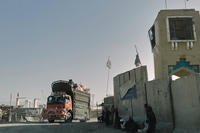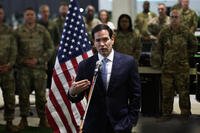Some 500-600 U.S. troops will remain in Syria indefinitely to prevent a resurgence of ISIS, Joint Chiefs Chairman Army Gen. Mark Milley said Sunday.
The U.S. commitment to preventing Afghanistan from becoming a terrorist base for attacks against the U.S. will also require a U.S. troop presence for at least the next several years, Milley said on ABC-TV's "This Week.
In addition, the buildup of forces in the Gulf region to counter threats from Iran will have to remain in place until a diplomatic settlement can be reached, Milley said.
Milley's remarks appeared to signal that U.S. national security interests would continue to require backup from the military despite President Donald Trump's oft-stated desire to take the U.S. out of the "endless wars" of the Middle East.
On Syria, Milley said "the footprint will be small but the objective will remain the same, the enduring defeat of ISIS."
He said that "less than a thousand," — probably in the range of 500-600 — U.S. troops would remain to secure oil wells and continue to partner with the Kurdish-led Syrian Democratic Forces for the defeat of ISIS.
"We're not going to go into specific numbers because we're still going through the analysis right now," Milley said in his first TV interview as Joint Chiefs chairman.
"There are still ISIS fighters in the region, and unless pressure is maintained, unless attention is maintained on -- on that group, then there's a very real possibility that conditions could be set for a reemergence of ISIS. So we're committed to do that," he said.
The daring U.S. raid earlier this month that resulted in the death of ISIS leader Abu Bakr al-Baghdadi had a "very significant disruptive effect on the organization as a whole," although the threat remained, he said.
ISIS has since announced that Abu Ibrahim al-Hashemi al-Qurayshi was the new "caliph" and issued a warning to the U.S. uploaded on the Telegram app: "Do not be happy."
ISIS has "apparently replaced [Baghdadi] with another leader" and "we do have a considerable amount of information on that individual," Milley said.
"And we'll see in the days ahead and the weeks ahead and the months ahead if he's able to piece together his organization or not," he added.. "We'll pay close attention to him and where opportunities arise, we'll go after him as well."
The U.S. had an estimated 1,000 U.S. troops in Syria when Trump last month ordered small contingents withdrawn from outposts in the northeastern part of the country.
Turkish President Recep Tayyip Erdogan then ordered his military and accompanying irregulars to invade northeastern Syria with the stated goal of creating a safe haven for the return of Syrian refugees. Erdogan is expected to meet with Trump at the White House Wednesday.
U.S. troop convoys began withdrawing from Syria into Iraq but U.S. troops, including mechanized forces, were later ordered back into Syria to secure oil fields and guard against an ISIS resurgence.
On Afghanistan, Milley said the U.S. had an enduring commitment to ensure that the country will "never again be a safe haven" for terror groups aiming to attack the U.S. and its allies.
"That mission is not yet complete," Milley said. "I suspect it will be ongoing into the future for several more years."
Another dilemma in the region is posed by Iran, Milley said. "Iran's been a challenge for the United States, you know, since the revolution in 1979," he said. "We hope diplomatic efforts will resolve the nuclear issue, the development of nuclear weapons with Iran, and we place our faith in the diplomatic efforts."
However, "we'll make sure that we maintain appropriate levels of military capabilities in the region to defend American interests if required."
In recent months, the U.S. has deployed an aircraft carrier battle group and additional troops to the region, along with Patriot anti-air missile batters to defend Saudi Arabia.
"Our government has chosen not to react militarily at this time" to provocations from Iran, Milley said, "but we have the capability to, and we've added some capability just as recently as last month, and we'll see."
"It depends on the scope, scale and nature of any kind of provocation that Iran does or any kind of threat they do against U.S. forces in particular, or against U.S. interests or our friends and allies in the region," Milley said.
— Richard Sisk can be reached at Richard.Sisk@Military.com.













